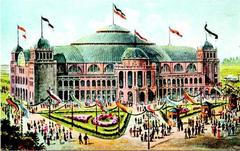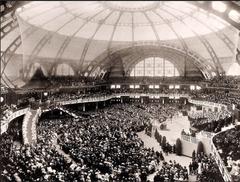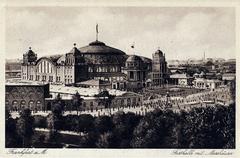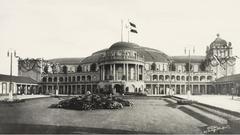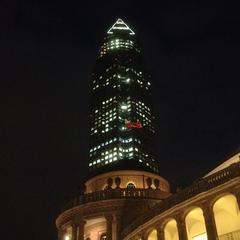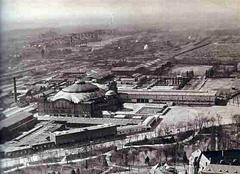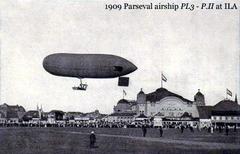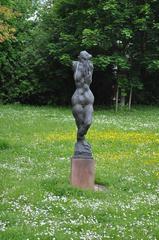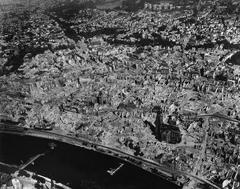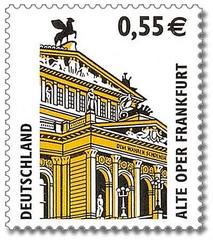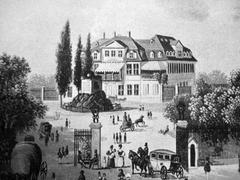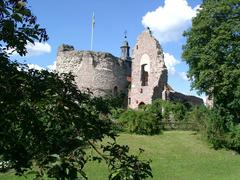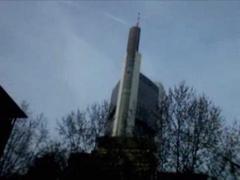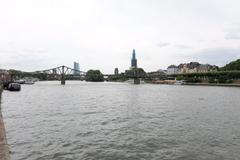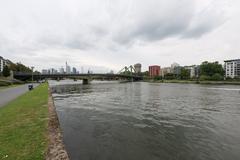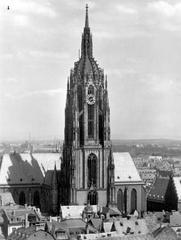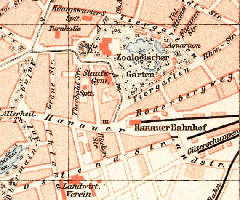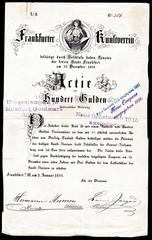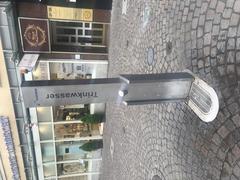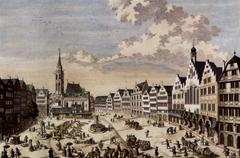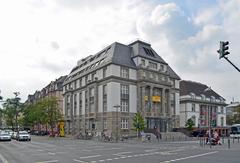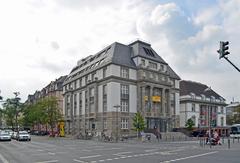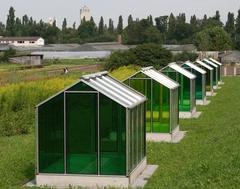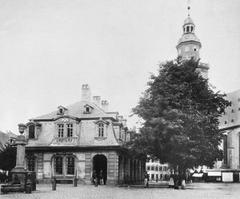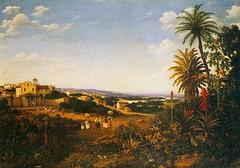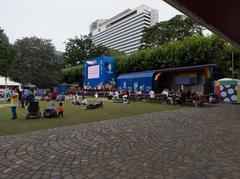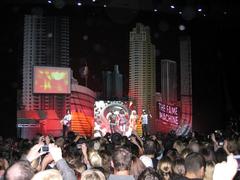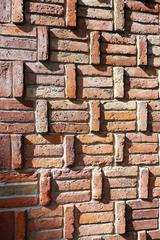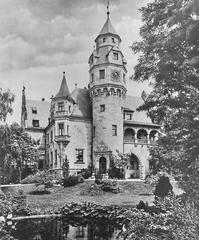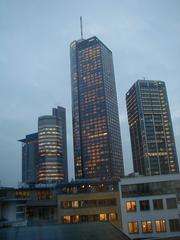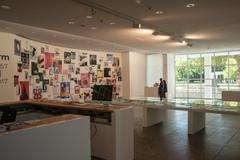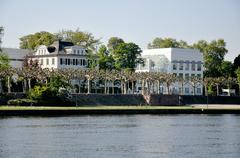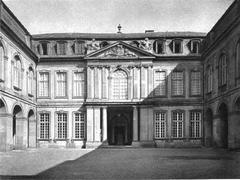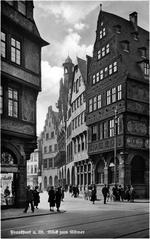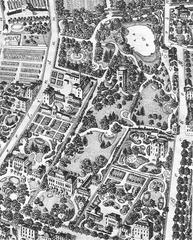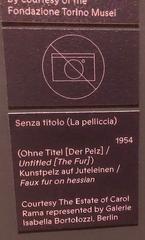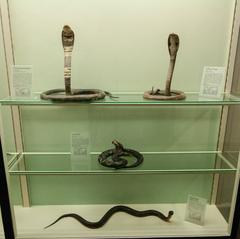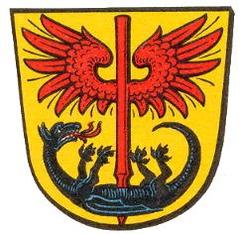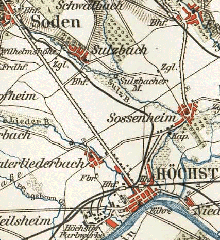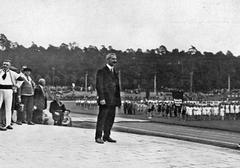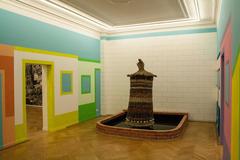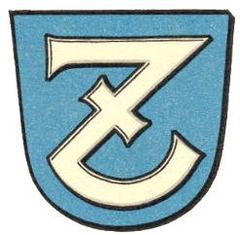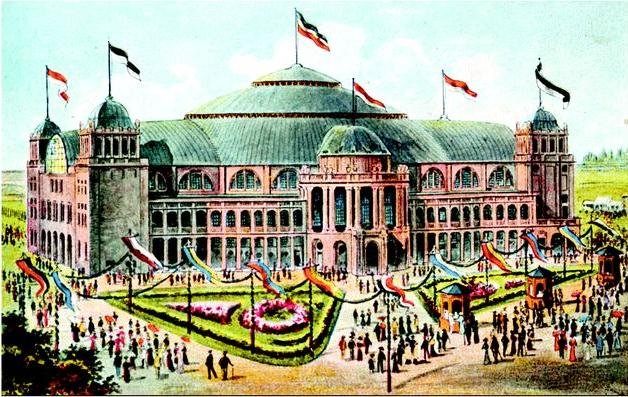
Festhalle Frankfurt: Visiting Hours, Tickets, and Guide to Frankfurt Historical Sites
Date: 14/06/2025
Introduction
The Festhalle Frankfurt stands as one of Germany’s most iconic venues—a testament to over a century of architectural innovation, cultural vibrancy, and historical resilience in the heart of Frankfurt. Originally constructed between 1907 and 1909, this neo-baroque masterpiece designed by Friedrich von Thiersch has survived wars, witnessed renowned events, and evolved into a premier destination for concerts, exhibitions, and international trade fairs. This comprehensive guide provides detailed information on visiting hours, ticketing, accessibility, travel tips, and the unique features that make the Festhalle a centerpiece of Frankfurt’s cultural landscape (Festhalle Official; Wikipedia; Frankfurt City Archive).
Table of Contents
- Historical Overview
- Visiting the Festhalle Frankfurt
- FAQs
- Key Dates and Figures
- Visitor Tips
- Summary and Travel Tips
- References
Historical Overview
Origins and Conception
Frankfurt’s long-standing tradition as a trade fair city laid the groundwork for the creation of the Festhalle. As industrialization accelerated in the late 19th century, the city needed a permanent, monumental venue to host large exhibitions and cultural gatherings. In 1906, a competition led to Friedrich von Thiersch’s winning design—a structure that combined neo-baroque grandeur with modern engineering (Frankfurt City Archive). Construction began in 1907, and the Festhalle was inaugurated in 1909 in the presence of Kaiser Wilhelm II.
Architectural Significance
The Festhalle’s architecture is renowned for its vast column-free steel-and-glass dome—rising 29 meters high and spanning 60 meters in diameter—making it one of Europe’s largest at the time (Festhalle Official). The neo-baroque style is evident in both the ornate exterior and the harmonious, light-filled rotunda. This design allowed for exceptional flexibility, accommodating up to 15,000 visitors for a range of events, from trade fairs to concerts.
Notably, the dome’s engineering was groundbreaking, providing an unobstructed interior and influencing later exhibition halls, such as the Centennial Hall in Wrocław (Wikipedia). The building’s imposing presence and rich ornamentation symbolize Frankfurt’s civic pride and ambitions as a major European city.
War, Reconstruction, and Preservation
The Festhalle endured significant damage during World War II, particularly from air raids in 1940 and 1944, resulting in the loss of much of its original roof and façade (Frankfurt City Archive). Postwar reconstruction restored the hall in simplified form, but later renovations, notably those completed in 2009, meticulously revived its historic features, including the dome, gold leaf detailing, and ocher façade (AS+P). The Festhalle is now a protected historical monument, with restoration efforts ensuring both historical accuracy and modern comfort.
Cultural Role and Symbolism
Since its opening, the Festhalle has served as a hub of cultural and economic life—hosting trade fairs, international exhibitions, legendary concerts, sporting events, and political gatherings (Messe Frankfurt Timeline). Its survival and restoration after WWII reinforced its importance as a symbol of Frankfurt’s resilience and cosmopolitan spirit. Today, the Festhalle remains a venue where tradition and innovation coalesce—its distinctive dome a recognized feature on the city skyline (Visit Frankfurt).
Visiting the Festhalle Frankfurt
Visiting Hours and Tickets
The Festhalle is primarily an event venue, so public visiting hours are aligned with scheduled events. On event days, doors typically open 90 minutes before the start time. Guided architectural tours are available on select days and must be booked in advance (Festhalle Messe Frankfurt – Visitor Info). Always check the official event calendar for the latest timings.
Tickets for concerts, exhibitions, and fairs can be purchased online via official ticketing partners or at the venue box office. For major events, early booking is recommended. Most event tickets include complimentary RMV public transport access on the day of the event (fr.de – Anreise zur Festhalle Frankfurt).
Accessibility
Festhalle Frankfurt is committed to accessibility. The main hall has a limited number of wheelchair spaces on a reserved podium; however, the upper tiers are not wheelchair-accessible. The venue offers ramps, elevators, and accessible restrooms on Level 0, with staff assistance available. For accessible seating or specific needs, contact the information hotline at +49 69 75 75 69 99 or email [email protected] (Messe Frankfurt Accessibility).
Getting There and Parking
Public Transport: The Festhalle is centrally located within the Messe Frankfurt complex. The “Festhalle/Messe” U-Bahn and tram station is directly adjacent to the main entrance, served by U4 (from Hauptbahnhof) and tram lines 16 and 17 (Festhalle Messe Frankfurt – Visitor Info). Most event tickets include free RMV transit.
By Car: While there is no dedicated parking directly at the Festhalle, several multi-storey car parks are nearby, such as Messeturm parking. During busy events, public transport is strongly recommended.
Nearby Attractions
Extend your visit by exploring nearby Frankfurt landmarks:
- Palmengarten: Frankfurt’s renowned botanical gardens.
- Museumufer: Embankment lined with leading museums.
- Römer: Medieval city hall in the historic old town.
- Skyline Plaza: Shopping and dining, opposite the Festhalle (fr.de – Anreise zur Festhalle Frankfurt).
Guided Tours and Special Events
Guided tours, often in partnership with the Jewish Museum Frankfurt, offer in-depth exploration of the Festhalle’s architecture and history. These tours are scheduled on selected dates; check the Jewish Museum’s calendar or email [email protected] to register. Special events like the Frankfurt Oktoberfest and international concerts further enrich the Festhalle’s cultural program (Navigating Waters).
Photographic Highlights
Capture the Festhalle’s striking neo-baroque façade, the grand dome, gold-leaf details, and restored cupolas. The rotunda interior, with its natural light and spacious design, provides excellent opportunities for photography. Commemorative plaques in the entrance hall add a reflective dimension to your visit (Wikipedia; Messe Frankfurt).
FAQs
Q: What are Festhalle Frankfurt’s visiting hours?
A: Visiting hours are event-based; doors usually open 90 minutes before events. For tours, check the event calendar.
Q: How do I purchase tickets?
A: Tickets are available via the Festhalle website, official partners, or at the box office.
Q: Is the Festhalle wheelchair accessible?
A: Limited main floor wheelchair spaces are available; upper tiers are not accessible. Contact the venue for assistance.
Q: What is included with my event ticket?
A: Most tickets include RMV public transport on the event day.
Q: Can I bring large bags or cameras?
A: Large bags and cameras are not permitted; use the cloakroom for small items.
Q: Are guided tours available?
A: Yes, on select dates. Book in advance via the Jewish Museum or Festhalle.
Key Dates and Figures
- 1907–1909: Construction period
- 1909: Official opening with Kaiser Wilhelm II
- 29 meters: Dome height (interior), 60 meters diameter
- 15,000: Max. visitor capacity
- 1948: First postwar trade fair
- 2009: Centenary restoration completed
Visitor Tips
- Arrive early to avoid queues and security checks.
- Travel light due to bag restrictions and lack of lockers.
- Use public transport—RMV access is often included with tickets.
- Check event details for specific opening hours and regulations.
- Contact the venue for accessibility needs well in advance.
- Explore nearby—museums, gardens, and shopping are within walking distance.
- Food & Drink: Snack stands inside; wider dining options in the surrounding district (Evendo – Festhalle Messe Frankfurt).
Summary and Travel Tips
The Festhalle Frankfurt is a living monument blending historic grandeur with modern amenities, serving as a versatile venue for major events and as a gateway to Frankfurt’s cultural heritage. Its central location, excellent public transport links, and regular guided tours make it accessible year-round. Plan your visit by checking event calendars, securing tickets early, and leveraging accessibility services if needed. Use the Audiala app for personalized event recommendations and real-time updates (Festhalle Messe Frankfurt; Messe Frankfurt Timeline).
Whether you’re attending a concert, exploring architectural marvels, or immersing yourself in Frankfurt’s vibrant culture, the Festhalle offers an experience that bridges the city’s illustrious past and dynamic present.
Visuals and Media
Virtual Tour of Festhalle Frankfurt
Map and Directions to Festhalle Frankfurt
Related Articles
- Top Frankfurt Historical Sites to Visit
- Guide to Messe Frankfurt Trade Fairs
- Exploring Frankfurt’s Architectural Landmarks
Contact and Further Information
For general inquiries, contact Festhalle Frankfurt at +49 (0) 69 / 24 74 55 - 400 or [email protected] (Visit Frankfurt – Festhalle Frankfurt). For accessibility, use the hotline or email [email protected].
References
- Festhalle Official
- Wikipedia
- Frankfurt City Archive
- Messe Frankfurt Timeline
- AS+P
- Visit Frankfurt
- Festivals United
- Messe Frankfurt Accessibility
- Evendo – Festhalle Messe Frankfurt
- fr.de – Anreise zur Festhalle Frankfurt
- Navigating Waters
- Frankfurt Tipp – Concert Highlights
